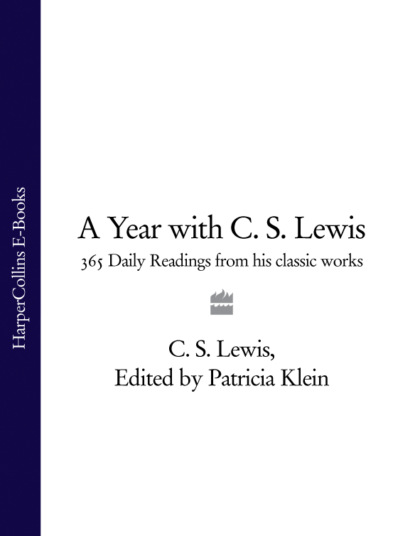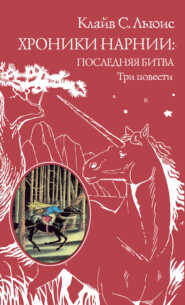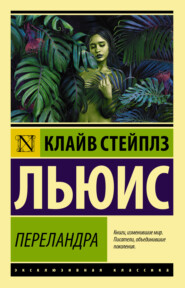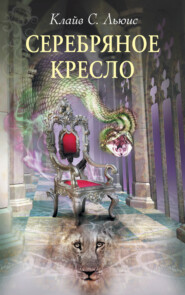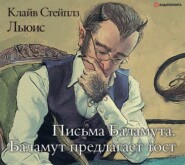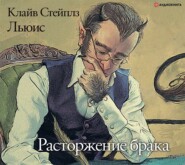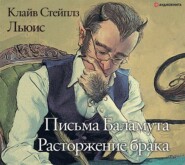По всем вопросам обращайтесь на: info@litportal.ru
(©) 2003-2024.
✖
A Year with C. S. Lewis: 365 Daily Readings from his Classic Works
Настройки чтения
Размер шрифта
Высота строк
Поля
If the world exists not chiefly that we may love God but that God may love us, yet that very fact, on a deeper level, is so for our sakes. If He who in Himself can lack nothing chooses to need us, it is because we need to be needed. Before and behind all the relations of God to man, as we now learn them from Christianity, yawns the abyss of a Divine act of pure giving—the election of man, from nonentity, to be the beloved of God, and therefore (in some sense) the needed and desired of God, who but for that act needs and desires nothing, since He eternally has, and is, all goodness. And that act is for our sakes. It is good for us to know love; and best for us to know the love of the best object, God. But to know it as a love in which we were primarily the wooers and God the wooed, in which we sought and He was found, in which His conformity to our needs, not ours to His, came first, would be to know it in a form false to the very nature of things. For we are only creatures: our role must always be that of patient to agent, female to male, mirror to light, echo to voice. Our highest activity must be response, not initiative. To experience the love of God in a true, and not an illusory form, is therefore to experience it as our surrender to His demand, our conformity to His desire: to experience it in the opposite way is, as it were, a solecism against the grammar of being.
—from The Problem of Pain
16 Our Three Responses to God (#ulink_76a55c01-5456-538e-8908-66fb09edd85b)
It is not simply that God has arbitrarily made us such that He is our only good. Rather God is the only good of all creatures: and by necessity, each must find its good in that kind and degree of the fruition of God which is proper to its nature. The kind and degree may vary with the creature’s nature: but that there ever could be any other good, is an atheistic dream. George Macdonald, in a passage I cannot now find, represents God as saying to men, ‘You must be strong with my strength and blessed with my blessedness, for I have no other to give you.’ That is the conclusion of the whole matter. God gives what He has, not what He has not: He gives the happiness that there is, not the happiness that is not. To be God—to be like God and to share His goodness in creaturely response—to be miserable—these are the only three alternatives. If we will not learn to eat the only food that the universe grows—the only food that any possible universe ever can grow—then we must starve eternally.
—from The Problem of Pain
17 Always Now (#ulink_1adb3d2a-94b3-5ba2-9512-3b294862e914)
Everyone who believes in God at all believes that He knows what you and I are going to do tomorrow. But if He knows I am going to do so-and-so, how can I be free to do otherwise? Well, here once again, the difficulty comes from thinking that God is progressing along the Timeline like us: the only difference being that He can see ahead and we cannot. Well, if that were true, if God foresaw our acts, it would be very hard to understand how we could be free not to do them. But suppose God is outside and above the Time-line. In that case, what we call ‘tomorrow’ is visible to Him in just the same way as what we call ‘today’. All the days are ‘Now’ for Him. He does not remember you doing things yesterday; He simply sees you doing them, because, though you have lost yesterday, He has not. He does not ‘foresee’ you doing things tomorrow; He simply sees you doing them: because, though tomorrow is not yet there for you, it is for Him. You never supposed that your actions at this moment were any less free because God knows what you are doing. Well, He knows your tomorrow’s actions in just the same way—because He is already in tomorrow and can simply watch you. In a sense, He does not know your action till you have done it: but then the moment at which you have done it is already ‘Now’ for Him.
—from Mere Christianity
18 Just a Bit of Coloured Paper? (#ulink_364ece22-1d59-5957-ac7b-2b33f76f2a9c)
I remember once when I had been giving a talk to the R.A.F., an old, hard-bitten officer got up and said, ‘I’ve no use for all that stuff. But, mind you, I’m a religious man too. I know there’s a God. I’ve felt Him: out alone in the desert at night: the tremendous mystery. And that’s just why I don’t believe all your neat little dogmas and formulas about Him. To anyone who’s met the real thing they all seem so petty and pedantic and unreal!’
Now in a sense I quite agreed with that man. I think he had probably had a real experience of God in the desert. And when he turned from that experience to the Christian creeds, I think he really was turning from something real to something less real. In the same way, if a man has once looked at the Atlantic from the beach, and then goes and looks at a map of the Atlantic, he also will be turning from something real to something less real: turning from real waves to a bit of coloured paper. But here comes the point. The map is admittedly only coloured paper, but there are two things you have to remember about it. In the first place, it is based on what hundreds and thousands of people have found out by sailing the real Atlantic. In that way it has behind it masses of experience just as real as the one you could have from the beach; only, while yours would be a single glimpse, the map fits all those different experiences together. In the second place, if you want to go anywhere, the map is absolutely necessary. As long as you are content with walks on the beach, your own glimpses are far more fun than looking at a map. But the map is going to be more use than walks on the beach if you want to get to America.
—from Mere Christianity
19 Traveling Without a Map (#ulink_be653341-3b5c-5077-a70f-93126212cd18)
Now, Theology is like the map. Merely learning and thinking about the Christian doctrines, if you stop there, is less real and less exciting than the sort of thing my friend got in the desert. Doctrines are not God: they are only a kind of map. But that map is based on the experience of hundreds of people who really were in touch with God—experiences compared with which any thrills or pious feelings you and I are likely to get on our own are very elementary and very confused. And secondly, if you want to get any further, you must use the map. You see, what happened to that man in the desert may have been real, and was certainly exciting, but nothing comes of it. It leads nowhere. There is nothing to do about it. In fact, that is just why a vague religion—all about feeling God in nature, and so on—is so attractive. It is all thrills and no work: like watching the waves from the beach. But you will not get to Newfoundland by studying the Atlantic that way, and you will not get eternal life by simply feeling the presence of God in flowers or music. Neither will you get anywhere by looking at maps without going to sea. Nor will you be very safe if you go to sea without a map.
—from Mere Christianity
20 Gradually the Truth Condenses … (#ulink_2e77cc0d-b8b8-57c0-8ad5-c19a0334d948)
Theology, while saying that a special illumination has been vouchsafed to Christians and (earlier) to Jews, also says that there is some divine illumination vouchsafed to all men. The Divine light, we are told, “lighteneth every man.” We should, therefore, expect to find in the imagination of great Pagan teachers and myth makers some glimpse of that theme which we believe to be the very plot of the whole cosmic story—the theme of incarnation, death, and rebirth. And the differences between the Pagan Christs (Balder, Osiris, etc.) and the Christ Himself is much what we should expect to find. The Pagan stories are all about someone dying and rising, either every year, or else nobody knows where and nobody knows when. The Christian story is about a historical personage, whose execution can be dated pretty accurately, under a named Roman magistrate, and with whom the society that He founded is in a continuous relation down to the present day. It is not the difference between falsehood and truth. It is the difference between a real event on the one hand and dim dreams or premonitions of that same event on the other. It is like watching something come gradually into focus; first it hangs in the clouds of myth and ritual, vast and vague, then it condenses, grows hard and in a sense small, as a historical event in first century Palestine.
—from “Is Theology Poetry?” (The Weight of Glory)
21 From Poetic Myth to Humble Fact (#ulink_d021d399-7c5d-5e96-8887-ca6640b7a3e6)
The essential meaning of all things came down from the “heaven” of myth to the “earth” of history. In so doing, it partly emptied itself of its glory, as Christ emptied Himself of His glory to be Man. That is the real explanation of the fact that Theology, far from defeating its rivals by a superior poetry, is, in a superficial but quite real sense, less poetical than they. That is why the New Testament is, in the same sense, less poetical than the Old. Have you not often felt in Church, if the first lesson is some great passage, that the second lesson is somehow small by comparison—almost, if one might say so, humdrum? So it is and so it must be. That is the humiliation of myth into fact, of God into Man; what is everywhere and always, imageless and ineffable, only to be glimpsed in dream and symbol and the acted poetry of ritual becomes small, solid—no bigger than a man who can lie asleep in a rowing boat on the Lake of Galilee. You may say that this, after all, is a still deeper poetry. I will not contradict you. The humiliation leads to a greater glory. But the humiliation of God and the shrinking or condensation of the myth as it becomes fact are also quite real.
—from “Is Theology Poetry?” (The Weight of Glory)
22 God’s Remedies (#ulink_b87346f3-ac22-52ed-b7eb-c2876bc585a1)
And what did God do? First of all He left us conscience, the sense of right and wrong: and all through history there have been people trying (some of them very hard) to obey it. None of them ever quite succeeded. Secondly, He sent the human race what I call good dreams: I mean those queer stories scattered all through the heathen religions about a god who dies and comes to life again and, by his death, has somehow given new life to men. Thirdly, He selected one particular people and spent several centuries hammering into their heads the sort of God He was—that there was only one of Him and that He cared about right conduct. Those people were the Jews, and the Old Testament gives an account of the hammering process.
Then comes the real shock. Among these Jews there suddenly turns up a man who goes about talking as if He was God. He claims to forgive sins. He says He has always existed. He says He is coming to judge the world at the end of time. Now let us get this clear. Among Pantheists, like the Indians, anyone might say that he was a part of God, or one with God: there would be nothing very odd about it. But this man, since He was a Jew, could not mean that kind of God. God, in their language, meant the Being outside the world, who had made it and was infinitely different from anything else. And when you have grasped that, you will see that what this man said was, quite simply, the most shocking thing that has ever been uttered by human lips.
—from Mere Christianity
1959 Lewis attends the first meeting of the Commission to Revise the Psalms, at the invitation of Archbishop of Canterbury Geoffrey Fisher.
23 On Authority (#ulink_6067b8d3-baaa-5867-9082-771578450378)
There are three things that spread the Christ-life to us: baptism, belief, and that mysterious action which different Christians call by different names—Holy Communion, the Mass, the Lord’s Supper. At least, those are the three ordinary methods..…
I cannot myself see why these things should be the conductors of the new kind of life. …. But though I cannot see why it should be so, I can tell you why I believe it is so. I have explained why I have to believe that Jesus was (and is) God. And it seems plain as a matter of history that He taught His followers that the new life was communicated in this way. In other words, I believe it on His authority. Do not be scared by the word authority. Believing things on authority only means believing them because you have been told them by someone you think trustworthy. Ninety-nine per cent of the things you believe are believed on authority. I believe there is such a place as New York. I have not seen it myself. I could not prove by abstract reasoning that there must be such a place. I believe it because reliable people have told me so. The ordinary man believes in the Solar System, atoms, evolution, and the circulation of the blood on authority—because the scientists say so. Every historical statement in the world is believed on authority. None of us has seen the Norman Conquest or the defeat of the Armada. None of us could prove them by pure logic as you prove a thing in mathematics. We believe them simply because people who did see them have left writings that tell us about them: in fact, on authority. A man who jibbed at authority in other things as some people do in religion would have to be content to know nothing all his life.
—from Mere Christianity
1926 Lewis gives his first lecture as a don in the English School at Oxford, entitled “Some Eighteenth-Century Precursors of the Romantic Movement.”
24 Finding Comfort (#ulink_69ffda45-40de-50d1-a25e-94fe0bf0dabc)
All I am doing is to ask people to face the facts—to understand the questions which Christianity claims to answer. And they are very terrifying facts. I wish it was possible to say something more agreeable. But I must say what I think true. Of course, I quite agree that the Christian religion is, in the long run, a thing of unspeakable comfort. But it does not begin in comfort; it begins in the dismay I have been describing, and it is no use at all trying to go on to that comfort without first going through that dismay. In religion, as in war and everything else, comfort is the one thing you cannot get by looking for it. If you look for truth, you may find comfort in the end: if you look for comfort you will not get either comfort or truth—only soft soap and wishful thinking to begin with and, in the end, despair.
—from Mere Christianity
25 We Couldn’t Make It Up (#ulink_a73c77de-bbc4-5163-ab29-26830a2fa36b)
Besides being complicated, reality, in my experience, is usually odd. It is not neat, not obvious, not what you expect. For instance, when you have grasped that the earth and the other planets all go round the sun, you would naturally expect that all the planets were made to match—all at equal distances from each other, say, or distances that regularly increased, or all the same size, or else getting bigger or smaller as you go further from the sun. In fact, you find no rhyme or reason (that we can see) about either the sizes or the distances; and some of them have one moon, one has four, one has two, some have none, and one has a ring.
Reality, in fact, is usually something you could not have guessed. That is one of the reasons I believe Christianity. It is a religion you could not have guessed. If it offered us just the kind of universe we had always expected, I should feel we were making it up. But, in fact, it is not the sort of thing anyone would have made up. It has just that queer twist about it that real things have.
—from Mere Christianity
January 1917 Lewis (age eighteen) returns to Great Bookham, Surrey, and William T. Kirkpatrick (“the Great Knock”) to prepare for Responsions, the entrance examination for Oxford University.
26 Not Like a River but Like a Tree (#ulink_fe7fa4de-4142-552b-a07d-ab3e3484d94b)
We are not living in a world where all roads are radii of a circle and where all, if followed long enough, will therefore draw gradually nearer and finally meet at the centre: rather in a world where every road, after a few miles, forks into two, and each of those into two again, and at each fork you must make a decision. Even on the biological level life is not like a river but like a tree. It does not move towards unity but away from it and the creatures grow further apart as they increase in perfection. Good, as it ripens, becomes continually more different not only from evil but from other good.
—from The Great Divorce, Preface
1942 The Oxford University Socratic Club, Somerville College, Oxford, holds its first meeting. Lewis serves as its first president.
27 Being Good (#ulink_397a54cf-8d0c-5520-a6a7-6050b3d297c5)
Even the best Christian that ever lived is not acting on his own steam—he is only nourishing or protecting a life he could never have acquired by his own efforts. And that has practical consequences. As long as the natural life is in your body, it will do a lot towards repairing that body. Cut it, and up to a point it will heal, as a dead body would not. A live body is not one that never gets hurt, but one that can to some extent repair itself. In the same way a Christian is not a man who never goes wrong, but a man who is enabled to repent and pick himself up and begin over again after each stumble—because the Christ-life is inside him, repairing him all the time, enabling him to repeat (in some degree) the kind of voluntary death which Christ Himself carried out.
That is why the Christian is in a different position from other people who are trying to be good. They hope, by being good, to please God if there is one; or—if they think there is not—at least they hope to deserve approval from good men. But the Christian thinks any good he does comes from the Christ-life inside him. He does not think God will love us because we are good, but that God will make us good because He loves us; just as the roof of a greenhouse does not attract the sun because it is bright, but becomes bright because the sun shines on it.
—from Mere Christianity
1964 Letters to Malcolm: Chiefly on Prayer is published by Geoffrey Bles, London.
28 Finding a Balance (#ulink_12ec3881-c388-521e-8197-ef675e996722)
Screwtape offers ways to cleverly exploit the Patient’s dry spell:





